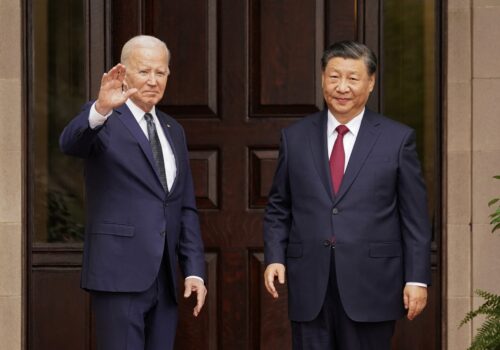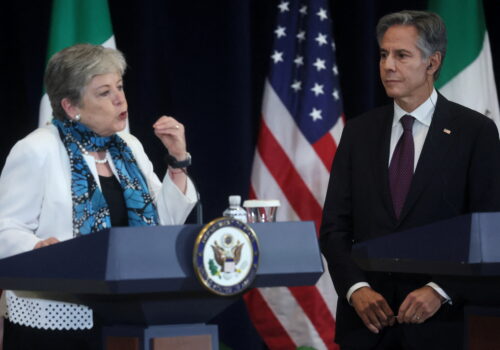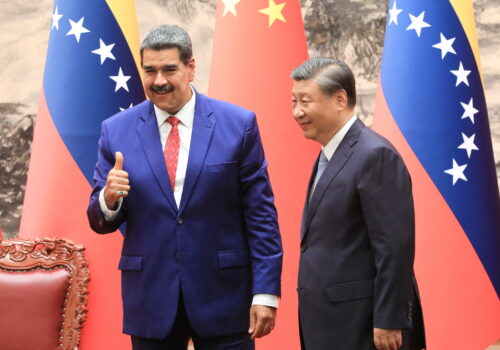China’s advances in Latin America should concern Trump
With all the media noise around President-elect Donald Trump’s personnel choices, it would be a mistake to miss this week’s news from Latin America. It’s all about China making economic gains and the United States losing ground.
Chinese leader Xi Jinping and US President Joe Biden will both visit the region this week for the Asia-Pacific Economic Cooperation (APEC) forum in Lima, Peru, followed by the Group of Twenty (G20) summit in Rio de Janeiro, Brazil, but there’s no doubt about which of the two leaders’ countries is ascendant in the region.
In a must-read Wall Street Journal feature, rich with graphics and photos, reporters James T. Areddy, Ryan Dubé, and Roque Ruiz note that China has replaced the United States as the dominant trading partner for all the region’s major economies, except for Mexico and Colombia. “Beijing has signed up most of Latin America and the Caribbean to an infrastructure program that excludes the U.S.,” they write.
Peru, the host country for APEC this year, with great fanfare will inaugurate the Port of Chancay today as the embodiment of this regional shift. The megaport opening underscores the greater attention Beijing has showered on the region in the face of comparative US indifference about its southern neighbors. US officials worry that Chinese warships could use the port, posing a strategic challenge.
Writes the Financial Times journalist Joe Daniels from the port, on the eve of its opening: “Chinese-made ZPMC unmanned cranes line the quay. BYD pick-up trucks sit ready to shuttle engineers around, while Huawei 5G internet towers have been freshly constructed to handle the automated operation.”
Mario de las Cases, the public affairs manager of the port for COSCO shipping, the Chinese state-owned company that will operate Chancay, said, “Everything is made in China. This is a huge opportunity not just for Peru but for the whole region.”
In contrast, Biden’s trip comes “at the tail end of four years marked by geopolitical conflicts in Europe and the Middle East, which steered his administration’s foreign policy focus away from Latin America,” write the Atlantic Council’s Martin Cassinelli and Caroline Costello. “Biden will arrive in Lima and Rio with little of substance to offer.”
In January, Trump will begin his second term determined to take a tougher approach to China, particularly when it comes to economic competition and trade. However, in Latin America and the Caribbean—with its thirty-three nations and 660 million people—he’ll confront the reality that the United States has already lost much ground. As General Laura Richardson, the then commander of US Southern Command, warned last year, China “is on the 20-yard-line, in the red zone to our homeland.” Trump’s promise of higher tariffs and tougher immigration controls won’t be the play call to address that challenge.
Frederick Kempe is president and chief executive officer of the Atlantic Council. You can follow him on X: @FredKempe.
This edition is part of Frederick Kempe’s Inflection Points newsletter, a column of dispatches from a world in transition. To receive this newsletter throughout the week, sign up here.
Further reading
Wed, Nov 13, 2024
As Biden bids farewell, Xi advances China’s influence in Latin America at the APEC Summit in Peru
New Atlanticist By Martin Cassinelli, Caroline Costello
Beijing is successfully pairing its economic diplomacy with action, and the United States should be concerned.
Mon, Feb 26, 2024
Redefining US strategy with Latin America and the Caribbean for a new era
Report By Jason Marczak, María Fernanda Bozmoski, Matthew Kroenig
The strategic interest of the United States and the countries of Latin America and Caribbean (LAC) lies in strengthening their western hemisphere partnership. However, the perception of waning US interest and the rise of external influences necessitate the rejuvenation of and renewed focus on this partnership.
Wed, Oct 23, 2024
China’s support for Maduro should be a warning to democracies in Latin America
New Atlanticist By Caroline Costello
China’s backing of Nicolás Maduro over the will of the Venezuelan people severely undermines Beijing’s claim to noninterference in Latin America.
Image: China's President Xi Jinping applauds during a signing ceremony at the Great Hall of the People in Beijing, China June 28, 2024. JADE GAO/Pool via REUTERS


